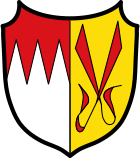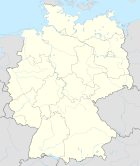Frankenwinheim
| coat of arms | Germany map | |
|---|---|---|

|
Coordinates: 49 ° 53 ' N , 10 ° 19' E |
|
| Basic data | ||
| State : | Bavaria | |
| Administrative region : | Lower Franconia | |
| County : | Schweinfurt | |
| Management Community : | Gerolzhofen | |
| Height : | 237 m above sea level NHN | |
| Area : | 14.73 km 2 | |
| Residents: | 969 (Dec. 31, 2019) | |
| Population density : | 66 inhabitants per km 2 | |
| Postal code : | 97447 | |
| Area code : | 09382 | |
| License plate : | SW , GEO | |
| Community key : | 09 6 78 130 | |
| Community structure: | 3 districts | |
| Association administration address: | Brunnengasse 5 97447 Gerolzhofen |
|
| Website : | ||
| Mayor : | Herbert Fröhlich (CSU / Free Voters) | |
| Location of the community of Frankenwinheim in the district of Schweinfurt | ||
Frankenwinheim is a municipality in the district of Schweinfurt in Lower Franconia .
geography
The place is in the Main-Rhön region, about 20 kilometers south of Schweinfurt . In terms of nature, Frankenwinheim and its district are part of the so-called Steigerwald foreland of Neuses . Characteristic for this part of the Iphofen-Gerolzhofener Steigerwaldvorland is the hilly appearance with the narrow valleys of small streams.
Community structure
The municipality consists of three parts of the municipality (the type of settlement in brackets):
- Brünnstadt ( Kirchdorf )
- Frankenwinheim ( parish village )
- Weinbergsmühle ( wasteland )
There are the districts of Brünnstadt and Frankenwinheim.
Neighboring communities
Neighboring communities are (starting from the north clockwise): Sulzheim , Gerolzhofen , Lülsfeld , Volkach and Kolitzheim .
history
Until the church is planted
Frankenwinheim was first mentioned in a document in 779 . The village, which was formerly part of the Wiesentheid rule of the Counts Schönborn, was part of the Franconian Empire from 1500 . It was mediatized by Bavaria in 1806 and, in the course of border adjustments in 1810, left to the Grand Duchy of Würzburg by Archduke Ferdinand of Tuscany , with whom it finally reverted to Bavaria in 1814. In 1818 the political municipality was established.
Incorporations
The former municipality of Brünnstadt was incorporated on July 1, 1977.
Population development
- 1970: 973 inhabitants
- 1987: 890 inhabitants
- 1991: 914 inhabitants
- 1995: 960 inhabitants
- 2005: 1016 inhabitants
- 2010: 1006 inhabitants
- 2015: 975 inhabitants
- 2018: 960 inhabitants
politics
The community is a member of the Gerolzhofen administrative community .
mayor
Herbert Fröhlich (CSU) has been mayor since May 1, 2014; he was re-elected on March 15, 2020 with 93.3% of the vote. The predecessor was Robert Finster (CSU).
Municipal council
The local elections in 2002, 2008 and 2014 resulted in the following allocation of seats:
| 2002 | 2008 | 2014 | 2020 | |
|---|---|---|---|---|
| CSU | 2 | 3 | 3 | 3 |
| Free voters | 4th | 4th | 3 | 3 |
| Christian citizen block Brno city | 2 | 1 | 2 | 2 |
| total | 8th | 8th | 8th | 8th |
coat of arms
The description of the municipal coat of arms, introduced in 1971, reads: “Split of red and gold; three shortened silver tips in front, red scissors behind ”.
Taxes
In 2017, the municipal tax revenue amounted to 967,000 euros, of which 284,000 euros (net) were trade tax revenues and 564,000 euros were the municipal share of income tax.
Culture and sights
Architectural monuments
Regular events
- Wine festival (usually last weekend in July)
- Oven festival around the historic oven building and ox on the spit in Brünnstadt
Economy and Infrastructure
There is a kindergarten.
The parish of Frankenwinheim belongs to the parish community St. Franziskus am Steigerwald.
Viticulture
Frankenwinheim is now an important wine-growing area in the Franconian wine-growing region . There is a vineyard around the village, the wine has been marketed under the name Frankenwinheimer Rosenberg since the 1970s. Frankenwinheim is part of the range Volkacher Main loop until 2017, the wineries in area were Maindreieck summarized. The loamy clay soils around the village are just as suitable for growing wine as the location in the Maingau climate zone, which is one of the warmest in Germany.
The people around Frankenwinheim have been growing wine since the early Middle Ages , mostly for their own use. The Franconian settlers probably brought the vine to the Main in the 7th century. In the Middle Ages, the region was part of the largest contiguous wine-growing region in the Holy Roman Empire. The people mostly operated part-time viticulture for self-sufficiency , at the same time export centers were already emerging, especially along the Main.
After the secularization at the beginning of the 19th century, viticulture had a major decline. Above all, locations with less favorable climatic conditions were completely abandoned. In addition, the emergence of pests such as phylloxera made cultivation difficult . The Franconian wine-growing region was not able to consolidate again until the second half of the 20th century. The use of fertilizer and improved cultivation methods had contributed to this, as had the organization in cooperatives and the land consolidation of the 1970s.
The vineyards in Frankenwinheim today mostly belong to the large winegrowers' cooperatives in the growing area with their headquarters in Nordheim am Main (DIVINO) and Repperndorf ( Winzergemeinschaft Franken ). Nevertheless, the place has developed its own wine culture, which has its most obvious expression in the organization of one of the larger wine festivals in the area at the end of July. Likewise, an own wine princess is chosen in the place, who is to represent the Franconian wine.
| Vineyard | Size 1993 | Size 2017 | Compass direction | Slope | Main grape varieties | Great location |
|---|---|---|---|---|---|---|
| Rosenberg | 30 ha | 29 hectares | south | 15-20% | Müller-Thurgau , Silvaner | Volkacher Kirchberg |
traffic
At the end of the 19th century, Frankenwinheim was connected to the Bavarian railway network. In 1893 the Kitzingen- Gerolzhofen section of the so-called Steigerwaldbahn (also Lower Steigerwaldbahn) was completed, and Frankenwinheim was equipped with a stop. The branch line connected from 1903 Kitzingen with the Schweinfurt Hauptbahnhof and was one of the longer branch lines in Germany.
Traffic on the route began to be reduced in the 1980s. In 1981 only passenger buses drove between Gerolzhofen and Kitzingen, freight traffic was given up in mid-2006. For a long time there have been initiatives to reactivate passenger traffic on the disused route. At the beginning of 2019 a fierce dispute broke out over the design of the restart, which has continued to this day, which became a political issue .
societies
- Sports club SV-Frankenwinheim
- Tennis club
- Horticultural Association Frankenwinheim
- Frankenwinheim volunteer fire department
- Fishing club
- Choral society
- Carnival club
literature
- Hans Ambrosi, Bernhard Breuer: German Vinothek: Franconia. Guide to the vineyards, winegrowers and their kitchens . Herford 2 1993.
Web links
Individual evidence
- ↑ "Data 2" sheet, Statistical Report A1200C 202041 Population of the municipalities, districts and administrative districts 1st quarter 2020 (population based on the 2011 census) ( help ).
- ↑ City Hall. Frankenwinheim community, accessed on July 4, 2020 .
- ^ Community Eschau in the local database of the Bavarian State Library Online . Bayerische Staatsbibliothek, accessed on July 3, 2020.
- ↑ Population figures on December 31, 2018. Bavarian State Office for Statistics, accessed on May 24, 2020 .
- ↑ http://www.wahlen.bayern.de/kw2014/gderaete-ufr-678.htm
- ↑ http://www.wahlen.bayern.de/biz/kowa_g2008.php?g=h&schluessel=678&suchbegriff=6
- ↑ 2020 municipal council election , accessed on July 3, 2020
- ^ Entry on the coat of arms of Frankenwinheim in the database of the House of Bavarian History
- ^ Ambrosi, Hans (among others): German Vinothek: Franconia . Pp. 50-52.
- ↑ Frankenwinheim: Wine Festival , accessed on May 21, 2019.
- ↑ Government of Lower Franconia: Vineyards in Bavaria broken down by area ( Memento of the original from July 28, 2018 in the Internet Archive ) Info: The archive link was automatically inserted and not yet checked. Please check the original and archive link according to the instructions and then remove this notice. , PDF file, accessed May 16, 2019.
- ^ Ambrosi, Hans (among others): German Vinothek: Franconia . P. 237.
- ↑ mainpost.de: By train through the inner city of Schweinfurt, August 2, 2019. Accessed on January 19, 2020 .
- ↑ mainpost.de: IHK: Steigerwaldbahn would strengthen the region, July 20, 2018. Accessed on January 20, 2020 .





